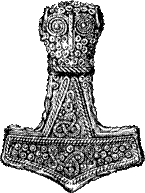 Asatrú
Beliefs
Asatrú
Beliefs
This article is intended as an introduction to Asatrú for young adults
Asatrú is a living religion
from
Asatrú recognizes several
dozens of gods and goddesses from many different cultural areas around Northern
and Western Europe, including what is now the
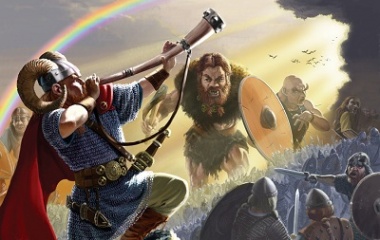
Heimdal is the guardian of
the
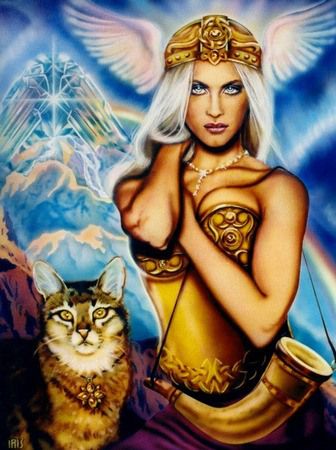
Freyja is from the tribe of
the Vanir. She is a warrior that
symbolizes freedom and love. She gets
the first pick of all the fallen heroes on the battlefield.
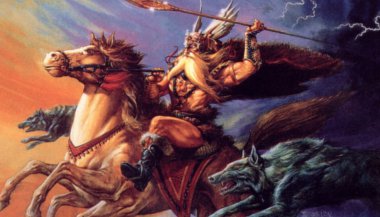
Odin is the leader of the
Aesir. He has two ravens that fly over
the world of men and report back to him what they have seen. He is also pictured here with his two wolves
that eat all the food given to Odin
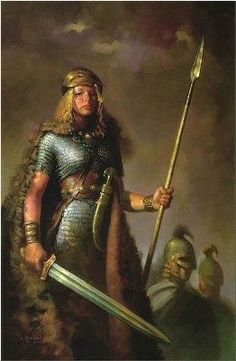
Frigga is Odin's wife. She knows all, though she often keeps her
knowledge to herself. She is attended by
several handmaidens that loyally due her bidding.
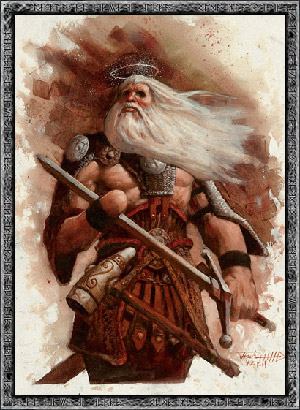
Tyr is known for his honesty
and forthrightness. He is often the
favorite of soldiers. He is missing a
hand due to an act of self-sacrifice that he performed for the good of the
world.
There are many other gods and
goddess, these are only a few to give you an idea of what the Asatrú gods are
like.
Asatrú is an Animistic,
Polytheistic, Fatalistic, tribal-centric, family oriented pagan religion and
tradition.
But what does that mean? Let's start at the beginning of that
statement and work our way through.
First is the term Animistic. Animism refers to a belief that all physical
things are imbued with a spiritual presence.
Most Asatrúar will agree that everything is composed of energy, and
energy is often seen as at least partially synonymous with spirit. While Asatrú does not teach that each and
every individual thing in the world has it's own spiritual existence, it does
teach that everything exists as energy, and that things with enough energy can
have their own spiritual presence.
Therefore, while an individual rock may not have a spirit associated
with it, a mountain certainly would.
Perhaps a large enough boulder would also, to a lesser degree. So while Asatrú isn't strictly Animistic, it
definitely does have an animistic element.
Asatrú goes far beyond an
idea that physical things exist in the realm of energy or spirit also. Many
material objects or places are thought to have an ethereal consciousness
associated with them, similarly to our consciousness being associated with our
bodies. There are many levels of
spiritual beings ranging from the "spirit of a woodland grove" to
animals, people, mountains, dwarves, trolls, elves, and gods.
The next term in our verbose
statement is Polytheistic. Polytheism is the belief in a multiplicity of
gods. Asatrúar (the plural of a follower
of the Asatrú tradition) believe in two tribes of gods known as the Aesir and
the Vanir. The two groups are believed
to inhabit various spiritual planes of existence which include Asgard,
Vanaheim, Midgard (our physical world), and several others. Each group of gods have several gods and
goddesses that make up members of these two distinct groups or tribes.
We come next to the term Fatalistic. This refers to the Asatrú belief that this
world and all the gods and spirits of all the nine worlds are heading to an
ending that cannot be prevented. While
the worlds themselves won't be destroyed, most of mankind and many of the gods
will face their end. This event is
called Ragnarok, and since it cannot be prevented, Asatrú is considered to be
Fatalistic.
Tribal-centric
refers to the tendency for Asatrú groups to operate in small tight-knit pseudo
family groups, or tribe-like organizations.
Since Asatrú has never had a central organizing authority, individual
followers tend to come together in small groups. When those groups grow to a certain size,
they often splinter into several smaller groups that continue on.
Asatrú is family oriented in that the family unit
is greatly valued. The loyalty to family
is of paramount importance, and is reflected in the myths of the gods and
goddesses of Asatrú.
Finally, it is both a religion and a tradition, and it's very
hard to separate the two. It is a
religion in that there is a greater spiritual understand, a story of creation,
a belief in an afterworld, and moral guiding principles. But it can also be thought of as a tradition,
because living the Asatrú religion consists of practicing the principles of
Asatrú in daily life and participating in the yearly rituals. There may be Asatrúar who practice the
traditions of Asatrú without actually spending much time worrying about whether
they believe in the existence of the gods or other worlds described in
mythology. The actual belief in the gods
is not a critical consideration for belonging to an Asatrú group or kindred and
being considered a Trú member of the kindred.
What do Asatrúar believe?
The followers of Asatrú
believe in living a life ruled by Honor.
They believe that their word must be their bond and that they must act
according to their values. They believe
that their honor is maintained if they live their life, striving to increase
their good qualities and decrease their character flaws. The character traits they seek to increase
are referred to as Virtues and modern Asatrú has quantified these into a group
called the Nine Noble Virtues. These are
Honor, Courage, Truth, Fidelity, Discipline, Hospitality, Industriousness,
Self-Reliance, and Steadfastness. An
Asatrúar must strive to be courageous in all things. They must live a truthful life, being loyal
to their family and kindred. They must
show self-discipline and always be hospitable to family or kindred. They should be hard-workers that are capable
of taking care of their own problems. If
they undertake a task they should be steadfast in their perseverance to succeed
at that task.
The followers of the Asatrú
religion take these virtues to heart. If
a kinsman visits another they must be offered drink at a minimum. Perhaps food and drink both, especially if
the trip was long. They must be offered
a place to stay if the trip is very long, or if they are very far from
home. An Asatrúar would not feel
comfortable being out of work for long, unless they were contributing something
back to their community, as they all share the belief that they must be a
productive member of their community.
They do not believe in asking for help for things which they can do for
themselves, although they enjoy coming together to work on community projects
that require more than one person to accomplish.
Asatrúar believe that there
are several distinct parts of a human being, among which can be found the
physical body, and the spirit, and possibly many more parts. While there is evidence in the lore that many
of the earliest people that followed these traditions believed in many parts of
the spirit/body complex, there is no general consensus within modern Asatrú as
to exactly which components or even how many might exist.
Asatrúar generally believe in
many spiritual places existing beyond the physical world, and there is a
general idea that the spirit (or parts of the spirit) may continue to live on
in one or more of these places. There is
examples in the lore of the spirits of dead heroes being taken to
Many Asatrúar believe in the
existence of all manner of creatures or spirits that exist below the level of
the gods but outside of the normal human experience. They may believe in a variety of spirits that
often live within houses, some of whom can be mischievous to the point of
danger, and some which can be quite helpful.
They may believe in spirits of the field or mountains. They may believe that they have ancestral
spirits that are watching over or protecting them. None of these beliefs are necessary but many
are common among Asatrúar.
Many Asatrúar believe that
they may very well live on in Asgard, the home of the gods, after their death
and be able to interact with a god or goddess with whom they feel a special
connection. Some Asatrúar do not strive
toward this goal, instead preferring to watch over their descendants for as
long as they may.
Asatrúar believe
that a person's actions matter more than his thoughts or beliefs, and that each
action causes permanent ripples in the web of wyrd that cumulatively effect
each person's fate. The web of wyrd is
the interconnectivity of energy that makes up all things in the nine
worlds. This energy is considered to be
the building blocks of all things spiritual and physical and it is believed
that an action taken at one place, effects all of the nine worlds and helps set
in motion the likelihood of future events.
Rather than a specific pre-determined fate, this is more similar to a
belief that you have a most-likely path that you will follow, based on what you
and your ancestors have done, and what you are now doing.
Another common Asatrú belief
is that there is no definitive good or evil; that there is no god or person
that is all good or all evil. That
actions that are helpful to you may be inadvertently harmful to others, but
this makes the action itself neither good nor bad. Asatrú recognize that certain behaviors are
always undesirable, such as lying, cheating, murdering and so forth; but that
some of these may be necessary on occasion to achieve a greater good. That most of people's actions occur in a
grey area that cannot be classified as implicitly good or implicitly evil, but
that some actions can be so close to one extreme or the other, that for all
practical purposes they are viewed as good or evil.
Most Asatrúar would agree that
the gods are interested in their children (all humans), and that they watch our
struggle here on Midgard, our physical world, in a similar way as to how a
great, great grandparent might watch the progress, success or failure, of their
great, great grandchild. The gods enjoy
helping us on the one hand, but understand better than we that that help always
comes with an unexpected consequence and that we must live our mortal lives on
our own, for the most part.
Asatrú also believe that
their personal growth comes from striving to emulate the best qualities of the
gods and the heroes of the people. Asatrúar
are a studious group and will often read the myths of the gods and goddesses,
called the Eddas, and read the stories of their ancestors who were Asatrú,
referred to as Sagas. From these stories
they will try to understand better what their ancestors believed about the
gods, and determine how they too might honor the gods and come to know them
better.
Asatrúar tend to believe that
each individual person can connect as easily with the spiritual world or the
gods as anyone else, and so their priest-class, called Godhis, is perceived as
having a mostly social or political role, not as an intermediary between the
Trú people and the gods. The primary
function of the Godhis (male form) and gydjas (female form) of Asatrú is that
of an administrator. All Godhis are
expected to be able to lead any of the blessings or other religious ceremonies
at need, but it is understood that anyone can do this with no special
preparation.
There is no central governing
body, nor any specific dogma universally recognized. Asatrú continues to be a very individualized
religion. Most of Asatrú is structured
around small groups known as Kindreds that may consist of 2 to hundreds of
members, with most kindreds probably having between 5 and 15 members. Since individual Asatrú practioners are
fiercely independent there has been no movement to organize into larger groups
with only a few exceptions.
Asatrúar tend to be very
loyal to the Kindred groups to which they belong. These groups are usually not open to anyone
wishing to join, but instead, newcomers must undergo some kind of training, or
initiation process, sometimes including oaths of fealty to the group. The family unit of a married man and woman
couple and their children are seen as the heart of the group. Anyone with experience in the military or
other protective roles are particularly appreciated by the Kindred. They view the entire groups as a kind of
extended family and everyone is expected to pitch in for the common good to the
extent they can feasibly do so.
Asatrúar believe that it is a
great thing to be a human and to live in this world. That our existence is a gift from Odin, and
that it would be remiss of them to waste that gift. They believe that living fully, having fun,
accomplishing great things and working hard while staying true to your promises
are the things that matter most in life.
That if you do all these things you honor your ancestors and the gods,
even if you do not acknowledge them.
There is no body of
literature that is considered implicitly sacrosanct, rather all of the
literature is considered an important window into understanding how the elder
Asatrú viewed the gods. This means that Asatrú has no Bible or Holy Book. Remember that Asatrú says that nothing is
either all good or all evil (harmful), here is a good example of that. Since there is no one Holy Book that teaches
what all Asatrúar should believe, it is left up to each person to go and study
the hundreds of books that are available and try to make sense of them and
decide what things are most important.
The good part of this is that an Asatrúar may learn a great deal of
history and culture and become very educated about their religion, and the bad
part of this is that it can be a daunting challenge, and many Asatrúar may put
this task off for a very long time.
What Asatrú means in Daily Life
What would it mean in one's daily
life to be Asatrú? Being Asatrú means
making decisions that you consider to be reasonable and honorable. It means being careful when you make
promises, and trying your very hardest to fulfill them. It means knowing the gods are there if you
need them and wanting the best for you.
It means living a life free of guilt or shame, knowing that it is good
to be human and enjoy this life. It
means having a vast knowledge base of power spiritual and magical history to
draw on if there be need. It means no
fears of the unknown, supernatural, or otherworldly events. An Asatrúar should feel empowered to explore
any kind of knowledge, whether that be scientific, spiritual, or
humanistic. It means no worries about
death, or what may come afterwards. It means sharing a bond with a community of
other practical, open-minded, fun-loving people that treat each other with
respect and live up to their word.
What do Asatrú people do
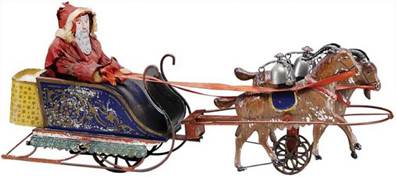 As a person that follows the Aesir and the Vanir,
there are a few things that you might do differently than other people. You would be required to honor the gods
during the 4 Great Blessings of the year.
These blessings mark the seasons, and correspond to Holidays which with
everyone is already familiar. The first
of these blessings is the blessing of Yule, which marks mid-winter, the end of
the old year, and is commonly known as Christmas among the Christians. If you were Asatrú you would celebrate this
blessing by sings holiday songs, giving and receiving gifts, watching for Red
Thor to fly by in his sleigh pulled by the goats named Thunder and Lightning
and drop off presents to the children of the families that were loyal to
him! You would light the Yule Log on
Fire and share Wassail (and apple cider drink) and egg nog with your
friends. On Yule night (December 31st)
you would participate in a blessing to give homage to the gods and make your
oaths (resolutions) for the next year!
As a person that follows the Aesir and the Vanir,
there are a few things that you might do differently than other people. You would be required to honor the gods
during the 4 Great Blessings of the year.
These blessings mark the seasons, and correspond to Holidays which with
everyone is already familiar. The first
of these blessings is the blessing of Yule, which marks mid-winter, the end of
the old year, and is commonly known as Christmas among the Christians. If you were Asatrú you would celebrate this
blessing by sings holiday songs, giving and receiving gifts, watching for Red
Thor to fly by in his sleigh pulled by the goats named Thunder and Lightning
and drop off presents to the children of the families that were loyal to
him! You would light the Yule Log on
Fire and share Wassail (and apple cider drink) and egg nog with your
friends. On Yule night (December 31st)
you would participate in a blessing to give homage to the gods and make your
oaths (resolutions) for the next year!
The second of the 4 Great
Blessings of the year is Ostarra.
Originally called Eostré, which then became Easter, this blessing marks
the Spring Equinox when Winter officially begins to give way to Summer. If you were Asatrú  you would celebrate this blessing by hunting Ostarra
eggs and staying up all night to greet the sun at dawn. You would exchange gifts and candy and
participate in a blessing in which you ask the goddess to bless the land with
fertility!
you would celebrate this blessing by hunting Ostarra
eggs and staying up all night to greet the sun at dawn. You would exchange gifts and candy and
participate in a blessing in which you ask the goddess to bless the land with
fertility!
 Next is the blessing of Mid-Summer, and I'm sure
you're beginning to the see the pattern here.
This blessing marks the middle of the Summer and there are usually
Barbeques, parties, and summer games to mark this seasonal passage. If you were Asatrú you would gather with as
many other Asatrúar as you could and engage in sports such as wrestling,
volleyball, axe-throwing, and swimming.
Next is the blessing of Mid-Summer, and I'm sure
you're beginning to the see the pattern here.
This blessing marks the middle of the Summer and there are usually
Barbeques, parties, and summer games to mark this seasonal passage. If you were Asatrú you would gather with as
many other Asatrúar as you could and engage in sports such as wrestling,
volleyball, axe-throwing, and swimming.
 The 4th blessing of the year that Asatrúar must
celebrate is Harvest. This one occurs
during the Fall Equinox and marks the official end of Summer and the beginning
of Winter. If you were Asatrú you would
gather with your kindred to honor the gods and appreciate the bounty of the
summer. There would be a huge feast with
lots of meat and vegetables, usually including a
The 4th blessing of the year that Asatrúar must
celebrate is Harvest. This one occurs
during the Fall Equinox and marks the official end of Summer and the beginning
of Winter. If you were Asatrú you would
gather with your kindred to honor the gods and appreciate the bounty of the
summer. There would be a huge feast with
lots of meat and vegetables, usually including a
Along with these 4 Great
Blessings, there are any number of minor blessings or celebrations that can be
thrown in throughout the year which aren't considered as important for each
Asatrúar to attend.
In your everyday life you
might find yourself leaving gifts out for the sometimes mischievous spirits
that inhabit the house, or the woods nearby.
You might find yourself offering a sacrifice of mead, ale, milk, or
honey to one of the gods or goddesses.
Many Asatrúar will have a small shrine or altar somewhere in their house
or yard where they typically make these offerings and observe the blessings. You would tend to go to this place whenever
you felt like talking to the gods. You
would wear a hammer of Thor, or perhaps some other symbol of one of the gods or
goddesses that you felt particularly close to, as an outward symbol of your
relationship with the gods. You would
introduce yourself to all of the gods, but there would most likely be one or
two that you felt a kinship, or perhaps a friendship with, and these one or
two, would become the ones that you usually went to with prayers, questions, or
just to talk. As an Asatrúar you would
find yourself being careful with the promises you made, because you would
expect to have calamitous things happen to you if you should not fulfill your
word! You would look for a kindred to
join because humans love company, but you would be very careful to make sure
any kindred you found was fully compatible, because if you commit to a kindred,
then you would feel bound to honor your word, even if you later decided that
this kindred wasn't a great fit for you!
You would enjoy living your life, work hard, and exercise your best
judgment. You would try to stand on your
own against the world, if need be, without asking for any help, but you would
ask the gods for help if you felt like you needed it. You would know that your kindred would
support you in all things and be there for you if you need a few extra hands. You would expect the occasional miracle, and
not be overly surprised when it happens, because Asatrúar expect their gods to
help them, especially if the appropriate sacrifice is made, and the gods have
been officially asked for help. You
would study history, study your ancestors traditions and beliefs, and
constantly try to expand your knowledge of the history of Asatrú. If you are the type of person interested in
mysterious things, such as supernatural knowledge, then you may find yourself
drawn to the Runes and begin studying them for divination or magic. Not all Asatrúar will have an interest in the
Runes, and some will be interested only in their historic use and as a system
of writing. As an Asatrúar you would be
expected to greet all your visitors with good cheer and food or drink. You would be a part of a community of people
that believe that the best things in life and living life well and honestly.